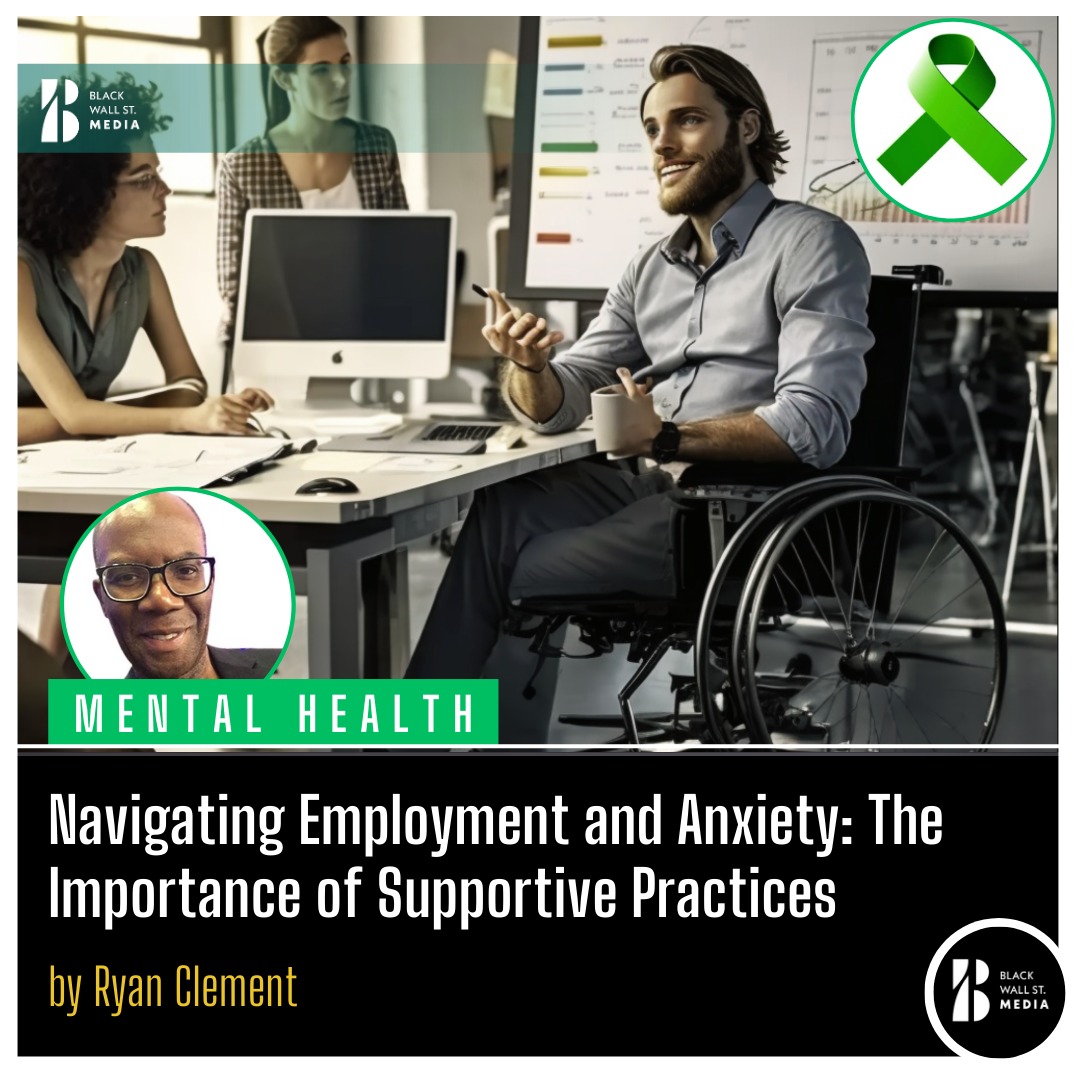Mental Health
"Navigating Employment and Anxiety: The Importance of Supportive Practices"
“”
Ryan ClementContributor

TODAY is the second day of Mental Health Awareness Week and the theme this year is ‘anxiety.’ I have had so many people reach out to me and I to them over these recent blogs.
Such a person is MagCat who said I could use anything she has written about her shared experience in her blog, which is very moving. I have learned that a bout of anxiety can arise from a place where there might not have appeared to be an apparent risk or significant risk to the sufferer previously. The following are MagCat‘s own words not mine:
“I’ve never been particularly anxious in the car. It’s as though my body is reacting to some perceived threat before my brain has had a chance to formulate a thought.
It’s so unsafe to have me in the front of the car that we decide I have to sit in the back to at least obscure my view somewhat. The reality we’ve found ourselves in is that I’m too anxious to leave the house for anything other than medical appointments.
Despite numerous campaigns raising awareness of Mental Health conditions, year on year the number of people requiring mental health support is increasing.”
My previous blog, Mental Health Awareness, spoke about our friend who attended an interview and was offered a job, which they accepted.
In the invite to the interview and during the interview process, our friend was not asked whether they believed they were disabled in any way and or required any adjustments to attend the interview (you will recall the ‘person’ in the centre of the image in the previous blog!), a point to which I shall return below.
The then prospective ‘equal opportunities’ employer who is now her employer refrained from asking these questions because it did not wish to know.
There were two main reasons for this. Firstly, such knowledge would be irrelevant to whether or not it offers a candidate a job.
Secondly, if it does not offer a candidate a job who discloses that they have a disability and they seek to bring a claim under the Equality Act 2010, the prospective employer could say it had no knowledge of the candidate’s disability and, therefore, could not be liable.
Such argument might be easier to make where an impairment is not visible. I leave it to others to debate whether this is good practice. For example, some of you might be thinking about reasonable adjustments to attend the interview.
For example, what if the candidate suffers from anxiety that is heightened in rush hour and the employer, for no reasonably objective purpose, seeks to hold the interview at 9am on a Monday?
Of course, the candidate could ask for the interview time to be moved to a later time to, say, 11am. However, unlike MJ from the previous blog, the candidate may not be confident enough to suggest this to a prospective employer unless such an offer was first made to them.
Back to our friend. They attend work for the induction and is given a questionnaire that asks, amongst other things, the following?
“Do you have an impairment?” and “Do you believe you are disabled under the Equality Act 2010” and “Do you require reasonable adjustments?”
Wow! These are a lot to contend with on one’s first day, which are questions that take employment lawyers years with which to grapple and to address! For example, a 5 day trial could be centred around these three alone before we even get to submissions! Let’s walk through them quickly.
Some candidates may not know that they have an impairment, especially a mental one.
For example, one might not realise that the severity of their anxiety may be deemed a mental impairment that forms the basis of a statutory disability.
Without the impairment, there will be no disability under the s.6 Equality Act 2010 because it is the very foundation of what leads one to be deemed statutorily disabled – see Mental Health Awareness Week 2023.
Secondly, which is common, a new employee may wish not to disclose this for reasons known to them, but a common one would be in fear of losing their newly found job; remember that term in the contract of employment, “The employer can dismiss you for any reason during the probationary period!”
Assuming the employee discloses the impairment, the question next is how do they answer, “Do you believe you disabled under the Equality Act 2010?”
This is not so simple as it may appear because it is the employment tribunal that determines whether a claimant is disabled under the 2010 Act not an employee, not an employer and, contrary to some belief, definitely not occupational health.
But, in any case, you may ask, what is the relevance of this question? Does it really matter what the employee believes or thinks?
For certain, an employer could not rely on a negative response to that question if the employee has already disclosed that they suffer from anxiety!
This last point feeds into the next question, “Do you require reasonable adjustments?” For some employers, this question only becomes relevant if the employee ‘believes’ or ‘thinks’ they are disabled under the 2010 Act. However, this is a problem.
The obligation to address the issue of reasonable adjustments and to make/implement them are on the employer not the employee. So, if the newly appointed employee discloses that they suffer from anxiety but do not believe (wrongly) they are disabled under the Equality Act 2010 the employer would ignore this important disclosure at their (the employer’s) peril!
In any case, what happens if an employee did not reveal their impairment at the induction because they did not know that they had it or they opted not to disclose it or they did not have an impairment at that material time?
It is important that employers have procedures in place that enables an employee to disclose at any time during their employment to an appropriate person their impairment and or disability.
In other words, because they did not fill out the form during induction that they did not have an impairment at the time does not mean they will not have one subsequently.
On this point, I asked a CIPD Human Resources professional from a multinational company what she would do if an employee disclosed to her that they were suffering from anxiety?
Amongst other things, confidentiality is paramount. It is important, she said, to take and make time for them. Also, she said, to bear in mind that it often takes a lot of courage for someone to disclose that they are suffering from anxiety.
“Priority is to listen,” and, “Don’t suggest they should change jobs and relationships!” Her advice can be heard below:
Now that the employer has knowledge of the impairment, it should consider whether our friend requires any reasonable adjustments to be made.
In my opinion, it is not good practice for an employer to seek to second guess whether an employment tribunal would deem the employee disabled in order solely to determine whether their obligation to make reasonable adjustments under the 2010 Act kicks in.
An employer should do it anyway! Also, an issue often overlooked is potential discrimination arising from disability.
This is where an employee suffers a detriment not because they are disabled but because of something arising from their disability. For example, our friend suffers from anxiety when they travel to work during the rush hour.
The employer has a policy that if an employee is late for work 5 times or more in a rolling twelfth months’ period they face disciplinary action.
Our friend has been late for work 6 times in the past 12 months because on those days they suffered severe anxiety attacks at the thought of travelling to work during rush hour.
Our friend is disciplined and given a written warning. We can see that our friend is not disciplined because of their impairment/disability but because of attending work late due to their impairment/disability.
Our equal opportunities employer says it treated our friend the same as any other employee. No!
Once the employer had knowledge of the impairment/disability or ought reasonably to have known, reasonable adjustments should have been explored and put in place.
Tomorrow’s blog is titled, ‘Discrimination.’
Ryan Clement, LLM, BA, BSc, Barrister
https://youtube.com/shorts/YHk7OFl7soU
Mental Health Awareness Week 2023
https://www.youtube.com/@RyanClement1
“”
Ryan ClementContributor
























